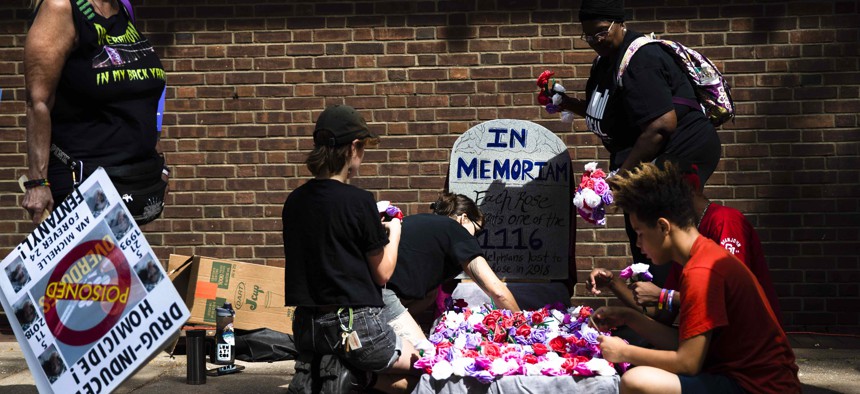Supervised Injection Site Does Not Violate Federal Drug Law, Judge Rules

Protesters assemble a makeshift memorial to those lost to drug overdoses last year during a demonstration in support of a proposed supervised injection site, outside the federal courthouse in Philadelphia, Thursday, Sept. 5, 2019. AP Photo/Matt Rourke
The decision could have ramifications throughout the country, as policymakers weigh whether to open facilities where people can take opioids and other illegal drugs.
A proposed site in Philadelphia where people could inject opioids and use other illegal drugs under the watch of medical professionals would not violate a federal drug law, a judge ruled Wednesday.
Pennsylvania nonprofit Safehouse is seeking to open the facility with the aim of curbing overdoses. It would be the first site of its kind in the U.S., the group says. In February, the U.S. Attorney for the Eastern District of Pennsylvania filed a lawsuit attempting to block the facility.
The case has focused on a section of the Controlled Substances Act known informally as the “crack house” statute. The Justice Department asked the court to declare that the proposed Safehouse site would be illegal under this provision.
But U.S. District Court Judge Gerald Austin McHugh wrote in a 56-page memorandum that based on his review of the law “there is no support for the view that Congress meant to criminalize projects such as that proposed by Safehouse.”
The judge went on to conclude that the section of law “does not prohibit Safehouse’s proposed medically supervised consumption rooms because Safehouse does not plan to operate them ‘for the purpose of’ unlawful drug use within the meaning of the statute.”
“The ultimate goal of Safehouse’s proposed operation is to reduce drug use, not facilitate it,” he added.
McHugh’s memorandum accompanied a two-page order that denied a “motion for judgment on the pleadings” that the federal government filed in June, urging the court to rule in its favor.
How the legal dispute will unfold from here is not entirely clear.
U.S. Attorney William M. McSwain said in a statement that the Department of Justice remains committed to preventing drug injection sites from opening and would keep fighting the case.
“Today’s opinion is merely the first step in a much longer legal process that will play out,” McSwain said. “This case is obviously far from over. We look forward to continuing to litigate it, and we are very confident in our legal position.”
Safehouse didn’t immediately respond to a request for comment. But Ronda Goldfein, a lawyer who is Safehouse’s vice president, told The Philadelphia Inquirer that she was reviewing the ruling closely “to make sure that we’re acting in complete conformity” with it.
“We said to the court and the public that we won’t open until we have authority to do so,” she added. “We’re now figuring the next step and hope to have some guidance from the court.”
Policymakers in other cities took notice of the court ruling. San Francisco Supervisor Matt Haney referenced it in an announcement Wednesday afternoon saying that he would introduce legislation requiring the city to create a “Safe Injection Site” there.
“As we speak people are shooting up on the streets of my district and overdoses are happening everyday—we need to get these people off the streets,” Haney said in a statement.
“I am introducing legislation to require that the city treat this like the crisis it is and do everything possible to have a site open immediately,” he added.
Safehouse emphasizes that it has no intention of providing any narcotics or opioids to people, unless those substances are federally approved for treating opioid addiction.
The nonprofit plans to offer people who go to its facility a variety of services, including physical and behavioral health assessments, addiction treatment, medical care and referrals to other programs.
People arriving at the site would have access to a “consumption room,” where they could opt to use drugs, and a “post-consumption observation room”. Medical staff would be available to administer oxygen or the medication Naloxone to counter any overdoses.
Citing city statistics, Safehouse says that in 2017 there were 1,217 drug overdose deaths in Philadelphia, up 34% from 907 in 2016. In 2018, overdose deaths decreased to 1,116. The nonprofit says there are over 120 supervised drug use sites in other countries and that no overdose deaths have been reported at any of them.
Bill Lucia is a Senior Reporter for Route Fifty and is based in Olympia, Washington.
NEXT STORY: Local Law Enforcement Should Be Able to Protect Airports From Drones, Report Says






